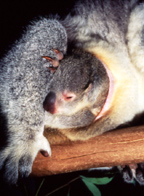Robyn Williams is a widely recognized and highly honoured (United Nations Media Peace Prize, Australian Humanist of the Year, various honorary doctorates, etc etc) science journalist in Australia. I can never resist his radio programs and nor could I resist a book title of his I stumbled across, Unintelligent Design: Why God isn’t as smart as she think s she is.
s she is.
I’d rather quote a few passages than ditch his style with my own summaries.
Guts
Take guts. The plan in mammals was to have a table-like arrangement: four legs set at each corner, with the belly horizontal to the ground. The digestive system — long for herbivores, shorter for meat eaters — is then slung from the spine. Works well. But then our ancestors, for some daft reason best known to themselves, decided to stand up. Horrors: the peritoneum, the bag of membrane containing our guts and reproductive organs is now hanging from a vertical broomstick, with pressures at the lower end, where there are too many exits and entrances and they are compromised by gravity. Result: piles, hernias, prolapses and squashed babies. (p.60)
The female pelvic girdle
Take the female pelvic girdle, which needs to be narrow enough for walking and to excite the admiration of men, but wide enough to allow a baby’s melon-sized head through. A system for inducing pliability via hormones is the compromise, and it works quite well, but it also fails rather often. Fistulas, caused by rips during childbirth, lead to leaks from the bowel into the vagina. They may last for years. Not nice. (p.60)
Sinuses
Here Robyn Williams cites another quoting Gray’s Anatomy. “The normal opening of the maxillary sinus is high above its floor and is poorly placed for natural drainage.” Sinuses give so many so much trouble because the drainage outlet is at the top! Gravity can’t do much to help compensate for that design.
Bad backs
Then there are bad backs. You and I are supposed to have been created in the image of God, so I presume He’s got one. I hope He’s a little better at looking after His than the vast number of us mortals happen to be. When mine is really bad it takes me twenty minutes to get out of bed, so severe are the muscle spasms. According to different accounts, we originally stood up: to peer over the tall grass, as meercats do; or to be able to wade through streams; or, the latest theory, to provide a smaller target for huge predatory eagles hunting for our ancestors. I suspect God did not have to go through the standing-up process and so has a back designed for upright living . . . . Backs can’t be an example of ID. They must, like Sir Humphrey Appleby of Yes, Minister, be a triumph of compromise. (pp. 61-62)
And finally
Halitosis, farting, vaginal discharge, reflux, snoring, rheumatism, warts, smelly armpits, varicose veins, menopause, brewer’s droop . . . these are not the marks of a designer at the top of his game. They are the trademarks of a natural process giving us only as much as we need to stay alive. (p. 71)
The compromised koala
Williams writes that his favourite example of compromise is the koala — with the female’s pouch for its young placed upside down! The explanation is that the koala evolved from a wombat like marsupial ancestor. Wombats are built to dig underground tunnels furiously. The flick dirt backwards with their front paws. An open pouch facing frontwards would be inviting the mothers to bury their young with dirt.
So backwards it was and, when one day the creature moved up a tree, perhaps to exploit a fresh food source, the ‘design’ came with it, too complicated to change. Yet in a few squillion years’ time adjustments may be forthcoming, if they are important enough. I suspect koala pouches may well stay as they are: as humans do with piles and hernias, koalas simply put up with the inconveniences and get on with life. (p. 63)

